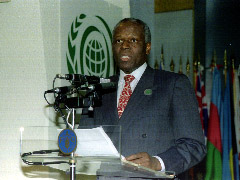


ANGOLA | ||
His Excellency José Eduardo dos Santos, President of the Republic of Angola | ||

I thank you for the invitation to take part in this forum whose noble and very ambitious objective is to establish conditions that will allow us to eradicate hunger: one of the most awful afflictions of mankind. We are at a very important moment of reflecting on the causes of this problem and on the ways and means for resolving it. All previous efforts made in this sense were not realistic enough with regard to the problem's dimensions because we were too optimistic regarding the means and resources available to overcome the problem. It was believed that the results of the so-called Green Revolution between 1963 and 1983, which resulted in a spectacular increase in production of basic cereals, as well as the later oil boom in many developing countries, would be sufficient to eliminate hunger, malnutrition and food insecurity in a matter of ten years. This did not happen, because it is not sufficient simply to apply new technologies or increase efforts to finance the agricultural sector if the socio-economic and institutional conditions are not favourable to increase food production, and if one does not have sufficient financial resources and sufficient markets open to take on this increase in productivity. These days, we are more aware of the great challenges we will have to face and of the need to adopt policies and strategies, both at national and at international level which will involve the active and concerted participation of all interested parties, governments, international institutions and all levels of civil society so that food security is guaranteed in every country, in each geo-political or geo-economic region, and at a global level through effective systems. Angola has already identified the main causes of food insecurity. Among these of course is social and political instability which is a result of the successive wars that have torn the country apart in the last three decades - especially the war that erupted after the elections held in September 1992. This last war, during which hundreds of thousands of people died and thousands were forced into exile from their original homes, destroyed important economic and social infrastructures, in some cases, destroying entire cities. During that period, agricultural and industrial production decreased considerably and distribution and trading of goods were practically brought to a halt. The food deficit had reached levels which had never been seen in the past. As a result, there was a drastic reduction in people's ability to function and their ability to acquire food. Average daily consumption of calories was reduced to 1 900 Calories per person. All these factors combined increased poverty, disease and infant mortality which reached the frightening figure of 320 per thousand. In order to understand the problem better it is only necessary to add that, according to a survey carried out by the Angolan Statistical Institute, more than 60 percent of the population lives below the poverty line and 80 percent of food consumed in the country has to be imported. It is only this year that we have noticed a slight increase in agricultural production, reaching 500 000 tons of cereals for a population which is about 12 million people. However, in order to try and redress the food deficit and to complement domestic production we will still need to spend our resources in order to import food, and at the same time, we will have to continue to depend on external aid. With the arrival of a lasting peace, the Angolan Government has firmly committed itself to resolve, as quickly as possible, the problem of food security, giving high priority to economic development programmes in productive sectors, such as agriculture and fisheries, industry, communications and construction, while at the same time, giving a high priority to the various social sectors. Our goal is the rational use of the agricultural and fisheries potential of the country, whilst our economy moves towards a market economy, offering help to small farmers and stimulating private investment. In order to attain these objectives, it will be necessary to make large public and private investments, in order to rebuild the infrastructure for production, trade and research, and for which we urgently need the help of the international community and our foreign partners. Added to these problems, we are also being threatened by a further destabilizing factor on our Northern border, as a result of the conflict in Eastern Zaire in the Great Lakes Region. Angola supports the idea of forming an international force which might ensure that humanitarian aid reaches the victims of this conflict and to prevent, at the same time, that this conflict spreads to other neighbouring countries. I would like my presence here, at such an important moment when the Lusaka Protocol is going to be implemented, to be interpreted as one more proof that Angola, once its sovereignty and territorial integrity have been guaranteed, is fully committed to maintaining peace, stability and national reconciliation, and is also committed to the fight against hunger, malnutrition and poverty. In this respect, we would like to state that we approve the Rome Declaration, and on behalf of the Republic of Angola and her people and on my own behalf, I would like to state that we are fully committed to fulfilling the seven Commitments of the Plan of Action adopted at this Summit. May I end by expressing our gratitude to FAO for the excellent manner in which this Summit was organized, which really opens a new period of cooperation amongst governments and organizations, in order to solve the problems that affect all of mankind. | ||
|
|
|
|

 |